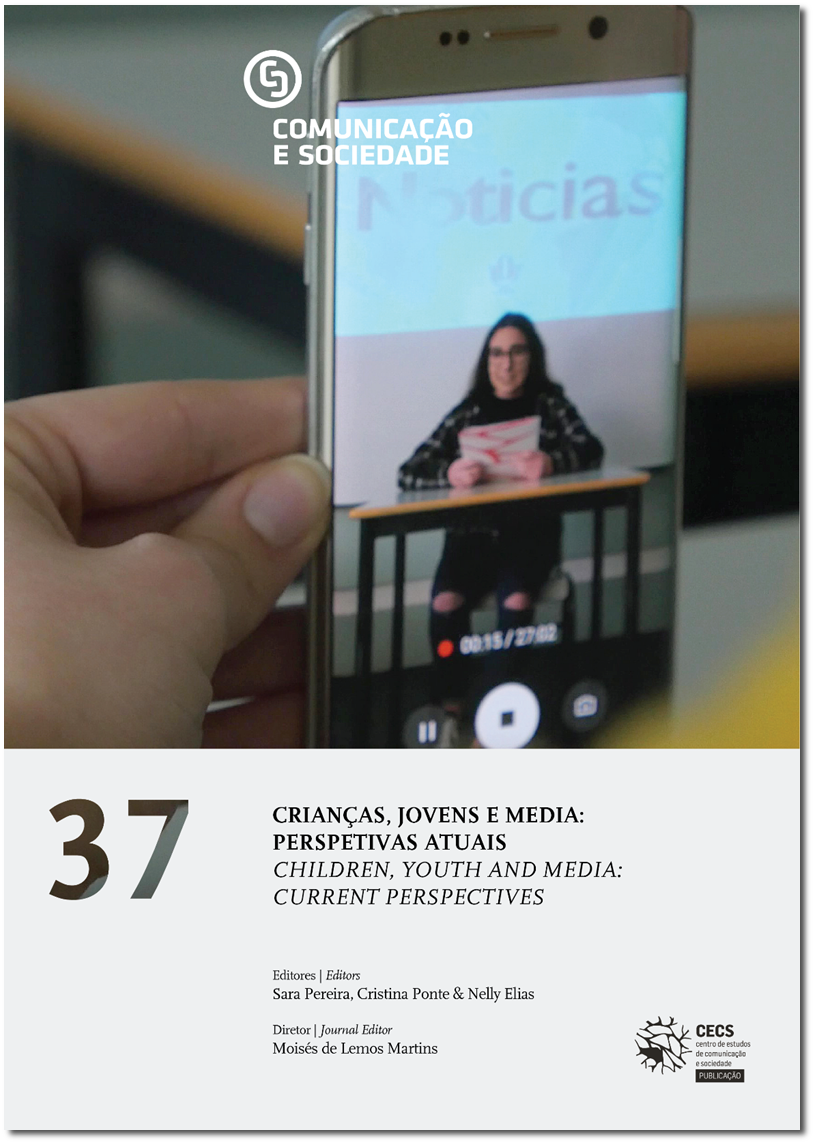Children, youth and media: current perspectives
DOI:
https://doi.org/10.17231/comsoc.37(2020).2687Abstract
Over the past two decades, there has been a surge in research about the relationship between children, young people and the media, in terms of the number of studies produced, topics addressed and methodologies used. Due to its multidisciplinary nature, this area has affirmed its position in the field of Communication Sciences and has marked the scientific agenda and inspired public debate about the impact of the media on the lives of children and young people and how they use and appropriate information and produce media content...Downloads
References
Buckingham, D. (2006, março) Media Education in the age of digital technology. Comunicação apresentada no 10.º aniversário do MED Congress “La sapienza di comunicare”, Roma.
Chiong, C. & Shuler, C. (2010). Learning: is there an app for that? Investigations of young children’s usage and learning with mobile devices and apps. Nova Iorque: The Joan Ganz Cooney.
Holloway, D., Green, L. & Love, C. (2014). ‘It’s all about the apps’: parental mediation of preschoolers’ digital lives. Media International Australia, Incorporating Culture & Policy, 153, 148-156.
Kabali, H.K., Irigoyen, M. M., Nunez-Davis, R., Budacki, G. J., Mohanty, H. S., Leister, P. K. & Bonner, L. R. (2015). Exposure and use of mobile media devices by young children. Pediatrics, 136(6), 1044-1050.
Krotz, F. (2007). The meta-process of “mediatization” as a conceptual frame. Global Media and Communication, 3(3), 256-260.
Lemish, D. (2020, 02 de abril). TV, video games and other media could actually help your children while we’re all staying at home. NJ.com. Retirado de https://www.nj.com/opinion/2020/04/tv-video-games-and-other-media-could-actually-help-your-children-while-were-all-staying-at-home-opinion.html
Lemish, D. (2015). Children and media: a global perspective. Malden, MA: Wiley-Blackwell.
Li, B. & Shin, W. (2017). Parental mediation of children’s digital technology use in Singapore. Journal of Children and Media, 11, 1-19.
Livingstone, S. (2020, 13 de maio). Digital by default: the new normal of family life under COVID-19. [Post em blogue]. Retirado de https://blogs.lse.ac.uk/parenting4digitalfuture/2020/05/13/digital-by-default/
Muis, K. R., Ranellucci, J., Trevors, G. & Duffy, M. C. (2015). The effects of technology- mediated immediate feedback on kindergarten students’ attitudes, emotions, engagement and learning outcomes during literacy skills development. Learning and Instruction, 38, 1-13.
Nathanson, A. (1999). Identifying and explaining the relationship between parental mediation and children’s aggression. Communication Research, 26(6), 124–143.
Neumann, M. M. (2014). An examination of touch screen tablets and emergent literacy in Australian pre-school children. Australian Journal of Education, 58(2), 109-122.
Nikken, P. & Jansz, J. (2014). Developing scales to measure parental mediation of young children’s internet use. Learning, Media, and Technology, 39, 250-266.
Nikken, P. & Schols, M. (2015). How and why parents guide the media use of young children. Journal of Child and Family Studies, 24(11), 3423–3435.
Paus-Hasebrink, I., Kulterer, J. & Sinner, P. (2019) Social inequality, childhood and the media. A longitudinal study of the mediatization of socialisation. Suiça: Palgrave MacMillan. https://doi.org/10.1007/978-3-030-02653-0
Pereira, S. (1999). A televisão na família – processos de mediação com crianças em idade pré-escolar. Braga: CESC/IEC. Retirado de http://hdl.handle.net/1822/4265
Pereira, S., Fillol, J. & Moura, P. (2019). Young people learning from digital media outside of school: the informal meets the formal. Comunicar, 58, 41-50. https://doi.org/10.3916/C58-2019-04
Ponte, C., Pereira, S. & Castro, T.S. (2019). Parenting young children in changing media environments with twenty years apart. Communicazioni Sociali, 2, 276-288. https://doi.org/10.26350/001200_000064
Radesky, J. S., Schumacher, J. & Zuckerman, B. (2015). Mobile and interactive media use by young children: the good, the bad, and the unknown. Pediatrics, 135(1), 1-3.
Schofield-Clark, L. (2011). Parental mediation theory for the digital age. Communication Theory, 21, 323-343.
Troseth, G. L., Russo, C. E. & Strouse, G. A. (2016). What’s next for research on young children’s interactive media? Journal of Children and Media, 10(1), 54-62.
Valkenburg, P. M., Krcmar, M., Peeters, A. L. & Marseille, N. M. (1999). Developing a scale to assess three styles of television mediation: instructive mediation, restrictive mediation, and social coviewing. Journal of Broadcasting and Electronic Media, 43(1), 52–67.
Wartella, E., Rideout, V., Lauricella, A. & Connell, S. (2013). Parenting in the age of digital technology: a national survey. Illinois: Center on Media and Human Development School of Communication Northwestern University. Retirado de http://static1.1.sqspcdn.com/static/f/1083077/22839022/1370380073813/PARENTING_IN_THE_AGE_OF_DIGITAL_TECHNOLOGY.pdf?token=ywpuHSykX7ykiNpr4IvemQ%2BPlX4%3D
Downloads
Published
How to Cite
Issue
Section
License
Authors own the copyright, providing the journal with the right of first publication. The work is licensed under a Creative Commons Attribution 4.0 International License.











